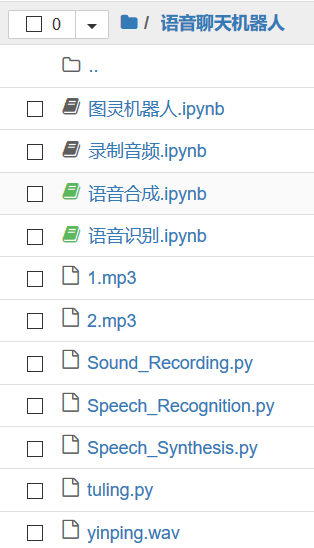目录
项目构想
项目感想
项目API调用
项目语言以及库
项目目录
文件构成
代码清单
main:2.Speech_Recognition.py
1. Sound_Recording.py
3.tuling.py
4.Specch_Sythesis.py
问题总结
1.调用playsound库进行播放音频时会出现使用后资源不释放产生以下错误:
PermissionError: [Errno 13] Permission denied: “1.MP3”
解决办法参考以下:https://blog.csdn.net/liang4000/article/details/96766845
2.仔细阅读各个API文档
3.如何退出死循环:添加if判断语音是否含有“退出”
项目视频展示
-
项目构想
录制一段音频并识别成字符,将字符传入图灵机器人并获得回复,将回复合成音频文件并播放。
-
项目感想
讯飞语音识别率还行,但是项目容错率低,并且项目基本调用API,没进一步研究语音识别技术的过程与实现,不过还是颇有收获,学习到了完成项目期间出现各种各样的问题的解决办法,所以只要你敢想,敢动手去做就一定会有收获。
-
项目API调用
讯飞语音识别,百度语音合成,图灵机器人。
-
项目语言以及库
Python+playsound+pyaudio+wave+os+百度API+讯飞API+图灵机器人API。
-
项目目录

-
文件构成
中文目录:语音识别为主函数----->>函数调用步骤(1.语音录制 2.语音识别 3.图灵机器人 4.语音合成)
英文目录:Speech_Recognition.py----->>(1. Sound_Recording.py 2.Speech_Recognition.py 3.tuling.py 4.Specch_Sythesis.py)
-
代码清单
main:2.Speech_Recognition.py
#!/usr/bin/env python
# -*- coding: utf-8 -*-
# @Time : 2019/12/27 16:10
# @Author : Cxk
# @File : Speech_Recognition.py
# -*- coding:utf-8 -*-
#
# author: iflytek
#
# 本demo测试时运行的环境为:Windows + Python3.7
# 本demo测试成功运行时所安装的第三方库及其版本如下,您可自行逐一或者复制到一个新的txt文件利用pip一次性安装:
# cffi==1.12.3
# gevent==1.4.0
# greenlet==0.4.15
# pycparser==2.19
# six==1.12.0
# websocket==0.2.1
# websocket-client==0.56.0
#
# 语音听写流式 WebAPI 接口调用示例 接口文档(必看):https://doc.xfyun.cn/rest_api/语音听写(流式版).html
# webapi 听写服务参考帖子(必看):http://bbs.xfyun.cn/forum.php?mod=viewthread&tid=38947&extra=
# 语音听写流式WebAPI 服务,热词使用方式:登陆开放平台https://www.xfyun.cn/后,找到控制台--我的应用---语音听写(流式)---服务管理--个性化热词,
# 设置热词
# 注意:热词只能在识别的时候会增加热词的识别权重,需要注意的是增加相应词条的识别率,但并不是绝对的,具体效果以您测试为准。
# 语音听写流式WebAPI 服务,方言试用方法:登陆开放平台https://www.xfyun.cn/后,找到控制台--我的应用---语音听写(流式)---服务管理--识别语种列表
# 可添加语种或方言,添加后会显示该方言的参数值
# 错误码链接:https://www.xfyun.cn/document/error-code (code返回错误码时必看)
# # # # # # # # # # # # # # # # # # # # # # # # # # # # # # # # # # # # # # # # # # # # # # # # # # # # # # # # # # # #
import websocket
import datetime
import hashlib
import base64
import hmac
import json
from urllib.parse import urlencode
import time
import ssl
from wsgiref.handlers import format_date_time
from datetime import datetime
from time import mktime
import _thread as thread
from Speech_Synthesis import *
from tuling import *
from Sound_Recording import *
from playsound import playsound
import os
STATUS_FIRST_FRAME = 0 # 第一帧的标识
STATUS_CONTINUE_FRAME = 1 # 中间帧标识
STATUS_LAST_FRAME = 2 # 最后一帧的标识
class Ws_Param(object):
# 初始化
def __init__(self, APPID, APIKey, APISecret, AudioFile):
self.APPID = APPID
self.APIKey = APIKey
self.APISecret = APISecret
self.AudioFile = AudioFile
# 公共参数(common)
self.CommonArgs = {"app_id": self.APPID}
# 业务参数(business),更多个性化参数可在官网查看
self.BusinessArgs = {"domain": "iat", "language": "zh_cn", "accent": "mandarin", "vinfo":1,"vad_eos":10000}
# 生成url
def create_url(self):
url = 'wss://ws-api.xfyun.cn/v2/iat'
# 生成RFC1123格式的时间戳
now = datetime.now()
date = format_date_time(mktime(now.timetuple()))
# 拼接字符串
signature_origin = "host: " + "ws-api.xfyun.cn" + "n"
signature_origin += "date: " + date + "n"
signature_origin += "GET " + "/v2/iat " + "HTTP/1.1"
# 进行hmac-sha256进行加密
signature_sha = hmac.new(self.APISecret.encode('utf-8'), signature_origin.encode('utf-8'),
digestmod=hashlib.sha256).digest()
signature_sha = base64.b64encode(signature_sha).decode(encoding='utf-8')
authorization_origin = "api_key="%s", algorithm="%s", headers="%s", signature="%s"" % (
self.APIKey, "hmac-sha256", "host date request-line", signature_sha)
authorization = base64.b64encode(authorization_origin.encode('utf-8')).decode(encoding='utf-8')
# 将请求的鉴权参数组合为字典
v = {
"authorization": authorization,
"date": date,
"host": "ws-api.xfyun.cn"
}
# 拼接鉴权参数,生成url
url = url + '?' + urlencode(v)
# print("date: ",date)
# print("v: ",v)
# 此处打印出建立连接时候的url,参考本demo的时候可取消上方打印的注释,比对相同参数时生成的url与自己代码生成的url是否一致
# print('websocket url :', url)
return url
# 收到websocket消息的处理
def on_message(ws, message):
global result
try:
code = json.loads(message)["code"]
sid = json.loads(message)["sid"]
if code != 0:
errMsg = json.loads(message)["message"]
print("sid:%s call error:%s code is:%s" % (sid, errMsg, code))
else:
data = json.loads(message)["data"]["result"]["ws"]
for i in data:
for w in i["cw"]:
result += w["w"]
# print("sid:%s call success!,data is:%s" % (sid, json.dumps(data, ensure_ascii=False)))
except Exception as e:
print("receive msg,but parse exception:", e)
return '识别出错!'
# 收到websocket错误的处理
def on_error(ws, error):
print("### error:", error)
# 收到websocket关闭的处理
def on_close(ws):
print("### closed ###")
# 收到websocket连接建立的处理
def on_open(ws):
def run(*args):
frameSize = 8000 # 每一帧的音频大小
intervel = 0.04 # 发送音频间隔(单位:s)
status = STATUS_FIRST_FRAME # 音频的状态信息,标识音频是第一帧,还是中间帧、最后一帧
with open(wsParam.AudioFile, "rb") as fp:
while True:
buf = fp.read(frameSize)
# 文件结束
if not buf:
status = STATUS_LAST_FRAME
# 第一帧处理
# 发送第一帧音频,带business 参数
# appid 必须带上,只需第一帧发送
if status == STATUS_FIRST_FRAME:
d = {"common": wsParam.CommonArgs,
"business": wsParam.BusinessArgs,
"data": {"status": 0, "format": "audio/L16;rate=16000",
"audio": str(base64.b64encode(buf), 'utf-8'),
"encoding": "raw"}}
d = json.dumps(d)
ws.send(d)
status = STATUS_CONTINUE_FRAME
# 中间帧处理
elif status == STATUS_CONTINUE_FRAME:
d = {"data": {"status": 1, "format": "audio/L16;rate=16000",
"audio": str(base64.b64encode(buf), 'utf-8'),
"encoding": "raw"}}
ws.send(json.dumps(d))
# 最后一帧处理
elif status == STATUS_LAST_FRAME:
d = {"data": {"status": 2, "format": "audio/L16;rate=16000",
"audio": str(base64.b64encode(buf), 'utf-8'),
"encoding": "raw"}}
ws.send(json.dumps(d))
time.sleep(1)
break
# 模拟音频采样间隔
time.sleep(intervel)
ws.close()
thread.start_new_thread(run, ())
def play(file):
playsound("%s"%file)
if __name__ == "__main__":
while(True):
"""
录音
参数 1 音频文件
参数 2 录音时长 单位(秒)
"""
audio_record("yinping.wav", 5)
"""
讯飞音频识别
APPID=ID,
APIKey=KEY,
APISecret=Secret,
AudioFile=音频文件
全局变量result:拼接返回结果
"""
global result
result=''
time1 = datetime.now()
wsParam = Ws_Param(APPID='申请的讯飞ID', APIKey='申请的讯飞KEY',
APISecret='申请的讯飞Secret',
AudioFile=r'yinping.wav')
websocket.enableTrace(False)
wsUrl = wsParam.create_url()
ws = websocket.WebSocketApp(wsUrl, on_message=on_message, on_error=on_error, on_close=on_close)
ws.on_open = on_open
ws.run_forever(sslopt={"cert_reqs": ssl.CERT_NONE})
time2 = datetime.now()
print("录音音频识别结果:"+result)
if("退出"in result):
"""
退出死循环
说关键词:退出
"""
print("程序已退出!!")
play("2.mp3")
break
else:
"""
图灵机器人回复
tuling(参数)
参数:讯飞音频识别回传字符串
百度语音合成
getBaiduVoice(参数)
参数:图灵机器人回传字符串
结果:合成音频文件1.MP3
"""
strss=tuling(result)
getBaiduVoice(strss)
"""
播放图灵机器人合成语音1.MP3
"""
play("1.mp3")
print("-------------------")
continue1. Sound_Recording.py
#!/usr/bin/env python
# -*- coding: utf-8 -*-
# @Time : 2019/12/27 18:18
# @Author : Cxk
# @File : Sound_Recording.py
import pyaudio
import os
import wave
# 用Pyaudio库录制音频
# out_file:输出音频文件名
# rec_time:音频录制时间(秒)
def audio_record(out_file, rec_time):
CHUNK = 1024
FORMAT = pyaudio.paInt16 #16bit编码格式
CHANNELS = 1 #单声道
RATE = 16000 #16000采样频率
p = pyaudio.PyAudio()
# 创建音频流
stream = p.open(format=FORMAT, # 音频流wav格式
channels=CHANNELS, # 单声道
rate=RATE, # 采样率16000
input=True,
frames_per_buffer=CHUNK)
print("开始录音...")
frames = [] # 录制的音频流
# 录制音频数据
for i in range(0, int(RATE / CHUNK * rec_time)):
data = stream.read(CHUNK)
frames.append(data)
# 录制完成
stream.stop_stream()
stream.close()
p.terminate()
print("录音完毕...")
# 保存音频文件
wf = wave.open(out_file, 'wb')
wf.setnchannels(CHANNELS)
wf.setsampwidth(p.get_sample_size(FORMAT))
wf.setframerate(RATE)
wf.writeframes(b''.join(frames))
wf.close()
# audio_record("yinping.wav", 5)
3.tuling.py
#!/usr/bin/env python
# -*- coding: utf-8 -*-
# @Time : 2019/12/27 17:50
# @Author : Cxk
# @File : tuling.py
import requests
import json
def tuling(info):
appkey = "申请的图灵机器人KEY"
url = "http://www.tuling123.com/openapi/api?key=%s&info=%s"%(appkey,info)
req = requests.get(url)
content = req.text
data = json.loads(content)
answer = data['text']
print("图灵机器人回复:"+answer)
return answer
4.Specch_Sythesis.py
#!/usr/bin/env python
# -*- coding: utf-8 -*-
# @Time : 2019/12/27 19:38
# @Author : Cxk
# @File : Speech_Synthesis.py
from aip import AipSpeech
# import random
def getBaiduVoice(text):
""" 你的 APPID AK SK """
APP_ID = '申请的百度ID'
API_KEY = '申请的百度KEY'
SECRET_KEY = '申请的讯飞Secret'
client = AipSpeech(APP_ID, API_KEY, SECRET_KEY)
result = client.synthesis(text = text, options={'vol':5,'per':4})
if not isinstance(result,dict):
# i=random.randint(1,10)
with open('1.mp3','wb') as f:
f.write(result)
# return i
else:
print(result)
-
问题总结
1.调用playsound库进行播放音频时会出现使用后资源不释放产生以下错误:
PermissionError: [Errno 13] Permission denied: “1.MP3”
解决办法参考以下:https://blog.csdn.net/liang4000/article/details/96766845
2.仔细阅读各个API文档
3.如何退出死循环:添加if判断语音是否含有“退出”
if("退出"in result):
"""
退出死循环
说关键词:退出
"""
print("程序已退出!!")
play("2.mp3")
break-
项目视频展示
Python人工智障聊天机器人
最后
以上就是勤奋黑夜最近收集整理的关于人工智障聊天机器人项目构想项目感想项目API调用项目语言以及库项目目录文件构成代码清单问题总结项目视频展示的全部内容,更多相关人工智障聊天机器人项目构想项目感想项目API调用项目语言以及库项目目录文件构成代码清单问题总结项目视频展示内容请搜索靠谱客的其他文章。








发表评论 取消回复